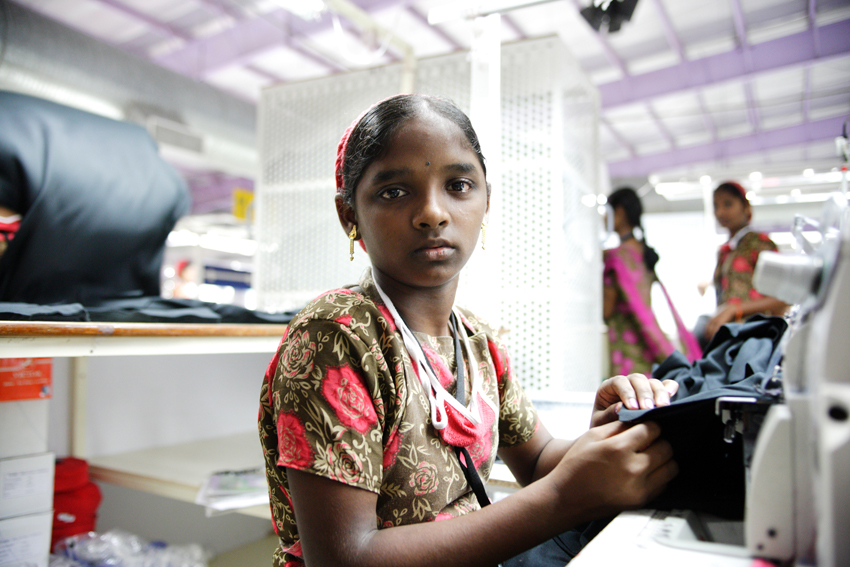
Dutch media focuses on abuses in the Indian textile sector
Indian textile workers make clothing in harrowing conditions for clothing chain stores such as C&A and H&M. The workers are barely permitted to leave the factory site, are paid more than a quarter of their wages only after three years, and there are no trade unions. These findings were published by the Dutch newspaper Volkskrant in early September, after a visit, together with SOMO, to the textile factory KPR Mill. Other Dutch and Belgian newspapers, television and radio also showed interest in the story. Dutch political parties submitted written questions about this issue in Parliament. H&M and C&A both responded in the press.
Responses of C&A and H&M
C&A has issued three statements. In its first written statement, C&A stated that it had thought that it was doing business with a different company, Quantum Knits. C&A only recently discovered that this is a full subsidiary of KPR Mill. C&A stated that it ended its business relationship with KPR in 2007, after indications emerged of the existence of a Sumangali system. In a second statement, C&A stated that KPR only manufactured a test shipment of 30 items. The actual order, for 58,000 men’s sweaters, was allegedly cancelled last week, because the working conditions at the company were ‘suspicious’. Finally, C&A stated on Friday in a telephone statement that the communication Department initially made a mistake: it turns out that C&A never placed orders with KPR Mill, not even before May 2007 (source: Volkskrant 4 September 2010).
H&M immediately started an investigation on Friday 3 September into the working methods of KPR Mill. If these confirm that the controversial Sumangali system is being used, H&M will reconsider its cooperation with the company. (Volkskrant 3 September 2010(opens in new window) ). In an interview with Linda Johansson, the head inspector of H&M India, in the newspaper on 10 September, it became clear that H&M will first try to exert influence in order to actually improve the work situation, by continuing to work together with the factory.
Sumangali system
The approximately 9000 girls who work in the factory are not permitted to leave the factory by their managers, or hardly ever. There are no trade unions present, which is contrary to the internal agreements. Furthermore, many of the girls work in unhealthy circumstances. Some of them have breathing difficulties, due to the high temperatures. Cotton balls have been found in the throats of several former employees. Many of the girls are lured to the factory with promises of a dowry after the employee has been employed for three years. A dowry is of great importance for Indian women, in order to be able to get married. This is referred to as the Sumangali system, and it has been designated as unacceptable by various governments, NGOs and businesses. Due to the unhealthy working conditions, the girls at KPR Mill often do not reach the three-year mark, which means they miss out on their dowry.
SOMO thinks that the large clothing companies must accept their responsibility, not by closing the factories or stopping production altogether, but by improving the conditions in the factories. Fair employment contracts, allowing access to trade unions and good working conditions, including freedom of movement and a living wage, are factors which the workers will ultimately benefit more from.
Later this year, a more extensive study on the situation and abuses in the clothing industry in India will be published in the context of the European Coalition for Corporate Justice (ECCJ) campaign Rights for People, Rules for Business. This campaign is working to achieve improved European regulations in order to prevent these types of harmful practices. For example, European companies should not only be held accountable for human rights abuses and environmental pollution which is caused by them, but also by their subsidiaries and suppliers.
SOMO is part of the European Coalition for Corporate Justice. SOMO has been carrying out research for years into working conditions in the clothing and textile sector. The studies are often carried out in cooperation with the Clean Clothes Campaign(opens in new window) and the India Committee of the Netherlands(opens in new window) .
|
Explanation of C&A production at KPR Mill On 27 August 2010, a group of journalists visited the textile and clothing manufacturer KPR Mill in India, at the invitation of the ECCJ. The group visited the Arasur complex in Coimbatore, the largest of the four production locations owned by KPR Mill. In this complex, raw cotton is processed into materials, and clothing is produced from the materials which is ultimately sold in European clothes shops. When asked about their key customers, the management of KPR Mill showed items of clothing of H&M and C&A which they said were in production at that moment. The items in question were children’s leggings and a polo shirt for H&M and a men’s sweater for C&A (C.A.N.D.A.). Later, during a tour of the factory, the group of journalists came across a production line which was manufacturing the C&A men’s sweater at that moment. Confronted with the findings of the journalists and the ECCJ, C&A declared that it had already ended its contractual relationship with KPR Mill in 2007. At that time, various audits had revealed serious infringements of C&A’s code of conduct. The company was then approached in June 2010 by Quantum Knits (via a European importer). C&A decided to place a trial order with this factory. If successful, the trial order would lead to an order for 58,000 men’s sweaters. On 3 June 2009, Quantum Knits became a full subsidiary company of KPR Mill. KPR Mill’s clothing division operates under this name, and is located at KPR Mill’s Arasur complex. C&A claimed that it only discovered that Quantum Knits was a division of KPR Mill during a standard audit for new suppliers, and that the labour conditions had not improved since 2007. After this discovery, C&A claimed that it had cancelled the order for 58,000 men’s sweaters. According to C&A, it was a coincidence that the trial order was being manufactured on the day of the visit of the journalists. |
More information on the Rights for People, Rules for Business campaign can be found at: www.rightsforpeople.org(opens in new window)
Selection of media coverage:
3 September
Indian textile workers exploited by C&A and H&M(opens in new window) – de Volkskrant
C&A denies dealing with controversial Indian supplier(opens in new window) – Radio Netherlands Worldwide
European clothing chains accused of exploiting Indian workers(opens in new window) – Radio Netherlands Worldwide
4 September
Imprisoned between factory walls for dowry(opens in new window)
– de volkskrant
7 September
C&A: turning a blind eye to the cost of cheap clothes?(opens in new window) – Radio Netherlands Worldwide
18 September
Inde – Les damnées du prêt-à-porter(opens in new window) – Libération
Gap fuit les usines prisons indiennes(opens in new window) – Libération
Related news
-

-
Chain of consequences Published on:
 Joshua RosenzweigPosted in category:Publication
Joshua RosenzweigPosted in category:Publication Joshua Rosenzweig
Joshua Rosenzweig
-



